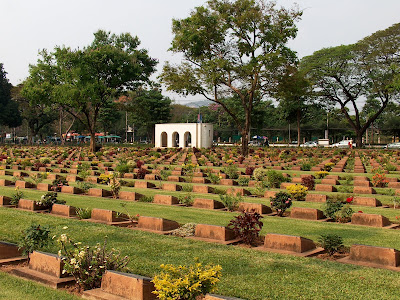What we remember from our childhoods may simply be psychological signposts to the kinds of people we really are. We don't choose what we remember. So much filtering of memory occurs, till in the end, bobbing on the surface, there's just a relatively small amount of flotsam with the mother ship far below the waves.
I remember, I remember... every time I was physically punished during my own school days and connected with every one of these memories is an echo of the seething feeling of injustice that accompanied those incidents.
Press the rewind button. It's 1962. I'm nine years old. I am in the playground of the village school where my father is the headmaster. Another, older boy has brought a rubber tiger mask into school. He has put it on and he is chasing round the yard, deliberately scaring girls who are screaming. I am in a gang of perhaps six who accompany the tiger boy. It's fun and the girls' screaming is affected. Nobody is really scared.
Miss Ford is on playtime duty. She not only calls an end to the high jinx, she sends the tiger boy and his followers to the headmaster's classroom where we wait in line. He, my father, being supportive of his younger colleague, tells us off and instructs us to hold out our hands. He walks along the line slippering all of us with a black plimsol. It hurts but not as much as the sense of injustice I feel inside. What had we done wrong? We were just having fun. Years later Dad apologised.

Fast forward to 1966. By achieving such a high mark in the eleven plus exam, I have won a scholarship to Hymers College in Hull where the posh boys go. It's a fee-paying direct grant school but each year, probably to ensure some council funding, they allow some plebs like me to join their hallowed ranks. I'm in music with Mr Watson. The room is like a large chapel. We are sitting in rows listening to some rather tedious classical music - Rachmaninov. Behind me one of the posh boys begins to rock his table on the hollow hardwood floor. Mr Watson calls out "Stop that!" above the soaring violins but the rocking noise continues. With his black academic gown splayed behind him, he surges up my row, comes to The Pleb's desk and cracks me hard across the temple with his open palm. He explains himself - "I said stop it!"
My anger boils over. I yell in my best East Yorkshire brogue, "It wasn't me you bastard!" and exit stage left. I am blubbering with shame and hatred and an overwhelming sense of injustice. I want to kill Watson. Put my muddy rugby boots on and jump up and down on his oily head. "It wasn't me you bastard!" Later no more is heard about the incident. Watson sweeps it under the carpet as if it never happened and I am grateful that I got away with swearing at him. If music be the food of love, play on Rachmaninov!
Onwards and I am sixteen. I don't want to wear a school cap. I feel stupid in it and my head is so big they don't make caps to fit me. I ride to school from the countryside. Thirteen miles there and thirteen miles back. I'm the only Hymers boy on the bus. At home I am listening to Bob Dylan and Leonard Cohen, Sgt Pepper's and Donovan and I saw Judy Collins on "The Simon Dee Show" singing "The Circle Game" and I have smoked marijuana, been drunk, known girls and I'm interested in Trotsky and Seurat and "Oz" magazine, Hull City and the civil rights movement in the USA. And they want me to wear a cap! Black and red with the school badge in the middle. I mean..
They have warned me. But now it is too late. I am in the office of Harry Roach, the much-feared headmaster. He is holding a thin bamboo cane. The room smells of polish and chalk and fear. A clock is ticking. I notice leather-bound books on the shelves, a large blotter on the oak desk, boys outside on the rugby field. He is lecturing me but I am not listening because I know what is coming. He tells me to bend over. I hear the cane swishing through the air then it hits my buttocks - one - two - three - four - five - six in rapid succession. The pain emerges like fire. My rump is ablaze and Harry is puffing after the exertion. All I can feel is the fire. I am like a whipped dog. I stumble from that dreaded chamber and my deranged hymn-singing torturer, determined to leave his horrible posh school in the summer.
And there were other times which I will not trouble you with now. Admittedly, I was no angel. I am sure there were occasions when I deserved the punishments I received but memory has chosen to let those bits of videotape settle on the ocean floor. Yet that plimsol, that open hand, that cane - I recollect those moments as if they happened just last week, remaining unsure what this says about my psychology.


























